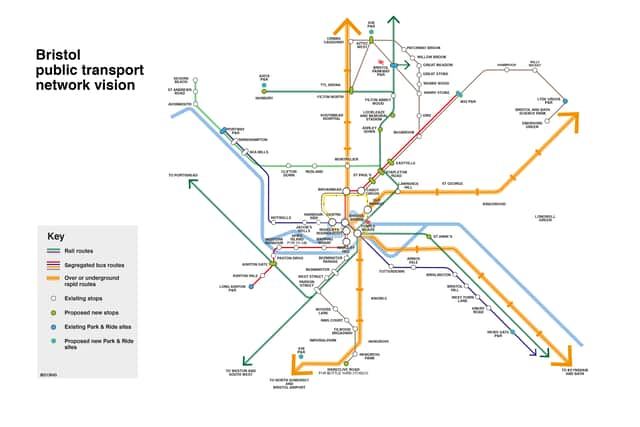Bristol’s planned £4bn mass transit system at high risk due to ‘frustrating lack of support’
and live on Freeview channel 276
Funding for Bristol’s new mass transit system is at “very high risk” after facing long delays, according to new cabinet reports.
Bristol mayor Marvin Rees said earlier this year diggers would begin work by the end of the decade, on creating new overground and underground railway routes, in a huge scheme costing billions of pounds. But that progress is now looking at risk of collapsing.
Advertisement
Hide AdAdvertisement
Hide AdThat risk is rated as “almost certain” and having a “high impact” on Bristol City Council, potentially leading to reputational impact, long-term congestion, increased air pollution, reduced regional productivity, and a threat to investment across the city, a report said.
According to the most recent corporate risk report: “Risk is still very high of failure to progress this project. Consultation has been proposed for some time, but not been agreed or taken forward by the combined authority. This has now delayed the whole project. There is significant risk that agreement will not be reached in a timely fashion.”


Plans for a Bristol Underground first surfaced in 2017, and estimates put the total cost at £4 billion. Council chiefs were pressed on the long delays to the mass transit system, and why no mitigating action is listed in the corporate risk report, during a cabinet meeting on July 12.
Green Councillor Emma Edwards said: “My question is about the lack of progress on the mass transit system being a high threat risk. With this high likelihood, why are there no mitigation actions that we can take or should take to reduce that?”
Advertisement
Hide AdAdvertisement
Hide AdDeputy mayor Craig Cheney placed the blame on the West of England combined authority, and a “frustrating lack of support”. He added that Bristol City Council’s upcoming switch, to a committee-based model instead of a mayor-run model, could increase the risk of losing the funding for the mass transit system.
He said: “To be frank we have been frustrated by the lack of support from the combined authority on this one. The investment is led through Weca, we’re reliant on the decisions of the combined authority, and post-2024 we think that through the committee system our influence on Weca will actually reduce.
“So I think the risks are the committee system, which is still unknown, and Weca, which we’ll continue to manage and work to try and mitigate.
Comment Guidelines
National World encourages reader discussion on our stories. User feedback, insights and back-and-forth exchanges add a rich layer of context to reporting. Please review our Community Guidelines before commenting.